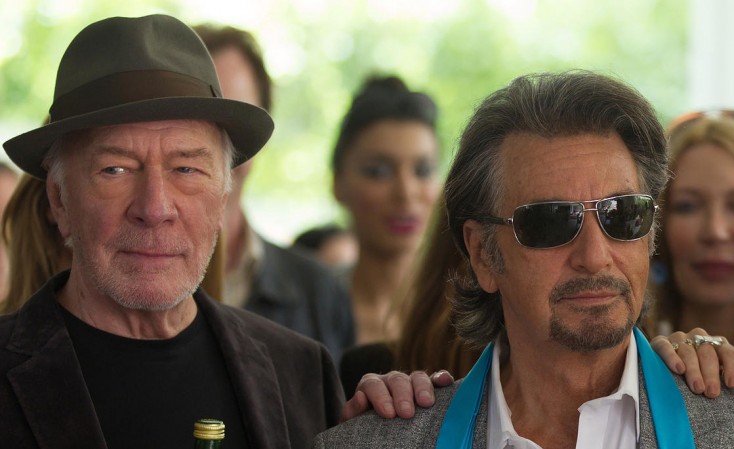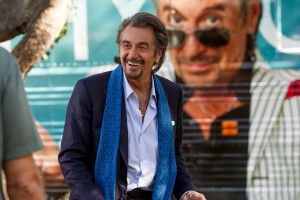By ANGELA DAWSON
Front Row Features
HOLLYWOOD—Oscar and Tony winning actor Al Pacino has played a number of roles in his long and celebrated career. From mobsters, notably the fictional mobster Michael Corleone in the “Godfather” trilogy, to Shakespeare’s Shylock (on stage and on film) in “The Merchant of Venice” to Phil Spector in an HBO biopic to Dr. Jack Kevorkian in “You Don’t Know Jack,” he’s always immersed himself into every character, making it his own.
In his storied five decades performing on stage and screen, though, the New York native never sang publicly. That, however, changes with “Danny Collins,” a heartwarming dramedy in which he plays an aging pop star that reconnects with his long lost son and his family after making an important discovery that might have changed his life. The all-star casts include Oscar winners Annette Bening and Christopher Plummer, Jennifer Garner and Bobby Cannavale. [private]
Inspired by the true story of Steve Tilston, a folk singer who uncovered an inspiring letter from former Beatles frontman John Lennon who had been mailed him the correspondence decades earlier. The letter, which was found by a collector, was Lennon’s response to an article in which the young singer/songwriter commented that he worried fame and fortune might adversely affect his songwriting ability. Lennon assured him, “Being rich doesn’t change your experiences in the way you think.” He also wrote down his phone number in case Tilston wanted to call him. Unfortunately, Tilston received the letter decades after Lennon was murdered near his New York home so he never got a chance to meet him. Nevertheless, he stayed true to his ideals and never “sold out.”
The true story inspired screenwriter Dan Fogelman (“Tangled,” “The Guilt Trip”) to write a “What if” fictional version about a singer—he changed the protagonist from a folkie to a pop star—who had taken a different path—one paved with fame and fortune, but also regret and unhappiness. After he learns of the letter, he goes on a quest to find his long lost son and his family and connect with them before it’s too late.
With Pacino in mind for the title role, he arranged to meet the celebrated actor backstage after one of his Broadway performances. Pacino took an instant shine to the writer and agreed to read the script. Once he read it, he was moved by it and agreed to do the part, even though he wasn’t a singer, and Fogelman had never directed a film. He figured it was something worth trying.
During production, Pacino found himself on stage at Los Angeles’ famed Greek Theatre singing Danny Collins’ big hit “Hey, Baby Doll,” a pop-py, saccharine-y tune that audiences love but he has grown to despise, in the story. Filming took place during an intermission at a performance by the band Chicago. Before an audience of 6,000 paying concertgoers, Pacino crooned the Neil Diamond-esque tune (sort of a “Sweet Caroline” knockoff) seven times during a 10-minute shooting window.
To Pacino’s and Fogelman’s delight, the audience got totally into it, singing along to the previously unheard of (yet catchy) pop song, written by Ciaran Gribbin and Greg Agar.
“Not one person (got up) to go to the bathroom,” recalls the filmmaker.
Of course, the scene was pure joy for Pacino, who got to live out a secret fantasy of being a rock star, if only for a moment.
At 75, the actor, who has teenage children as well as a grown daughter from different relationships, resembles an aging rock star for an interview, dressed in all black and with a shock of thick black hair. He talks about taking on the pop star character, dealing with his own albatross as a world-famous actor, the words of advice he got that kept him (mostly) on track and his own brief encounter with Lennon.
Q: When you receive a script and begin working on it, what is the process that you go through and has that changed over the years, creating a character?
Pacino: Yeah, it has changed a little. But first off, once you get the script, like this script for instance, and you’re where the director wants you to play his part, you say, “Well, when a director wants me, there’s obviously something of me they see in the role. If I like the script and connect to it someway, I see myself in it, and I set about working on it, which is usually the same as I’ve always done. I start with an empty canvas and, hopefully, I start with not knowing, like this was my first role.
With the empty canvas, I’ve got to paint something on it. You sketch a little bit. You try to stay with it. The best thing an actor can get is someone real that you’re playing, so you’ve got a model. If you don’t have a model you have to start to think. For instance, in this one, I started to think, “Well, I’m singing rock and roll. Who does he look like? What is he going to be like? What kind of songs does he sing?” Then you start going to the story, trying to understand the story more, and the reality of that and it’s complex. A lot of things come up. The early instincts are the ones you stay with, and I had the instinct that this (character) was a cross between Barry Manilow and Rod Stewart—the love child of those two.
Q: This film boasts nine original masters of John Lennon songs including “Imagine,” that were approved by his estate. Did your life ever cross paths with John Lennon?
Pacino: I saw John Lennon once in Central Park, and we smiled at each other. It was nice. I was just so pleased, which flattered that he recognized me. He lived at the Dakota, and I didn’t live far from there. He was with Yoko, who is very responsible for giving his songs to this movie. She really is a real advocate for the movie. I knew Bob Dylan; I spent time with Bob Dylan. That was in the 1970s, which I don’t remember. (He laughs.) Q: Do you feel like you’ve stayed true to your art? Were you able to relate to the character?
Pacino: My own art? Yeah, I think I did. I have to say—as modestly as I can say—that’s always been there. I was reminded by the people whom I loved and supported me all my life—especially my dear mentor and friend, (famed acting coach) Lee Strasberg. He kept talking to me about going back to where I came from, which is theater. It was constant reminder. When I went off the track—like anybody would—I had help and support going back on.
Q: Does Hollywood still make the kind of stories that you want to be a part of? Is it more difficult to find those kinds of scripts nowadays?
Pacino: Good scripts are hard to come by, always were. What you look for in a script changes. I believe in the fact that we all go through cycles as we all go on. I see it in my young kids. They’re different at age nine than they were at age 12 and then 14. We go through it as adults because if we’re living and going on and having experiences, we go to different places in ourselves. As time is ticking away, we’re moving on. So consequently the relevance of a piece of material has a lot to do with that.
Q: Is there anything you found eye-opening or life-changing moment like when your character gets that long-lost letter?
Pacino: Like all of us, I’ve had these little benchmarks. Mine was when I realized that I was going do this for the rest of my life; it didn’t just come to me. I was acting since I was really young, in school and then I went to performing arts school. Then, I went acting in (Greenwich) Village. We did plays. I did 16 shows a week. We used to pass the basket (for money) at the end of the show. That’s how we lived. That was my life. I was doing a lot of different things. I was doing revues. I was doing comedy. I was doing it to eat. It was a game to me.
It wasn’t until I started to really delve into roles that demanded more of me that it opened me up to another world. I mean by that the great Classics, the great Western Classics like (August) Strindberg and (Eugene) O’Neill, (William) Shakespeare, (Anton) Chekov, and then through just doing that finally I had this bit of a seminal moment, and I was young enough too. I was about 21-22, and I knew then when I was able to find that world that I could exist in and express in. I knew then that I was fine. I knew everything was going to be all right because this is what I was going to do. Everything else didn’t matter as much. What mattered was that as long as I was doing this, I was going to be okay.
Q: Do you feel like you have an actor’s equivalent of Danny’s hit song where maybe it was a role that you were happy to do, but directors or writers always reference that role, or even fans?
Pacino: I’ve done so much theater and stuff, the HBO thing, so that’s not really a problem anymore. It used to be “The Godfather,” naturally. “The Godfather” was the sort of start of something big, I guess. There was also “The Panic in Needle Park”—a film I love by the way. Jerry Schatzberg directed it. It was my first film (co-starring actress) Kitty Winn. It was wonderfully done film. But “Godfather” was so much of a shock for me; that was the film Francis (Ford Coppola) wanted me in. When a director wants you for something, you perk up. You say, “Well, he saw me in the part.” I was unknown at the time. He saw me (as Michael Corleone), and that was it. We had known each other a year before. He wanted me for another movie because he saw me on the stage and he wanted to use me in a picture that never got made. I spent almost a week with him in San Francisco and then I didn’t hear from him for a year. I guess that was a very valuable week because we connected and then he saw me in that part, and nobody could shake him from it. Everybody wanted him to, including me, at one point. But he stayed with it and it turned out to be extremely fortuitous and lucky for me. At the same time, I have no regrets. It will continue to be the seminal role for me in terms of my film career but I’ve done a lot of parts now and finally it’s getting (less obtrusive).
You go through stages when you’re young and you’re a so-called movie star. It’s a different world. And then you’re an actor. It’s the combination of fame and being an actor and anonymity and the use of anonymity, which I so love and cherish. Then you learn to live with the other thing (fame). The most sensible thing ever said to me was by Lee Strasberg, when he saw early on in my career that I was having a little trouble navigating. He said, “Darling, you simply have to adjust.” That’s all. In all, it was a refrain in the back of my mind, hearing his voice say that. It was very helpful when you’re ready to hear things. [/private]




